For construction bid management, generic tools just don't cut it. That's why the showdown between PlanHub, ConstructConnect, and Downtobid is important.
Each platform offers something different—PlanHub with its wide network, ConstructConnect's in-depth project insights, and Downtobid's straightforward approach with personalized touches.
They're all about making the construction process smoother, from bidding right through to wrapping up. This comparison digs into what each brings to the table, helping you decide which one ticks all the boxes for managing your construction projects effectively.
Before we compare PlanHub and ConstructConnect, we'll talk about our pre-construction software to help you speed up your bid preparation process.
Note: If you want to turn construction plans into relevant bid invites within minutes, try Downtobid. Our AI scans your project blueprints, extracts all of the scopes and gathers a list of subs for you to to invite. Simplify your preconstrution tasks today. Upload your project plans and try out our software today.
Key Takeaways
- Bid management is tough; PlanHub, ConstructConnect, and Downtobid tackle it with unique strengths.
- Downtobid shines with AI-driven invites, 30% higher responses, and verified sub data at $499/year.
- PlanHub offers a wide 400,000+ sub network but hits paywalls and outdated info.
- ConstructConnect delivers deep insights and takeoffs but struggles with access and data quality.
- Pick Downtobid for efficiency and value, PlanHub for networking, or ConstructConnect for insights.
Overview Of Downtobid
We bring a fresh perspective to construction bid management, combining the precision of artificial intelligence with the different needs of both commercial general contractors and subcontractors. Our software helps you better manage pre-construction as well as estimating, designed to make bid invitations seamless and personalized. We'll go over some of the key features and benefits of our software below.
Key Features and Benefits
- AI Co-Pilot for Preconstruction Teams: This feature revolutionizes how bid packages are reviewed for completeness and accuracy, significantly reducing manual effort and making sure important details are never overlooked.
- Efficient Bid Invitation Creation: Our software turns your plans into ready-to-send bid invites and scope sheets within minutes, incorporating a level of personalization that get responses. Our efficient process, which removes the need for bidding intent buttons, gets significantly higher engagement—resulting in an average of 30% more responses. That's why we're considered the best bid invite software.
- Centralized Planroom: The centralized Planroom feature streamlines your bid management by keeping all construction plans in one place. It's straightforward—making it easier for teams to access, review, and share necessary documents quickly. This approach not only saves time but also makes sure everyone is working from the latest set of plans, reducing confusion and errors.
- Easy Subcontractor Selection: Get a curated list of bid packages and the perfect subs to match. We have a directory of pre-vetted commercial contractors you can use as well.
Target User Base And Typical Use Cases
-
For General Contractors: We make the bid preparation process more efficient by ensuring no scope is missed, thanks to our AI that carefully examines every plan detail. Our tool then recommends bid packages and aligns them with the best-suited, local subcontractors, creating a detailed scope of work directly in the bid invitation to mitigate preconstruction discrepancies.
-
For Trade Contractors: The platform enables teams to scale their opportunity assessment, automatically filtering through invites to highlight those that match their trade, all while providing insightful analytics on bidding performance. We also have a bid board for subcontractors to help with tracking and estimation processes without manual data entry.
How To Use Downtobid
Discover how to quickly find bid packages and create tailored subcontractor invites with our software. Here's a video walkthrough with one of our founders, Andy Lee.
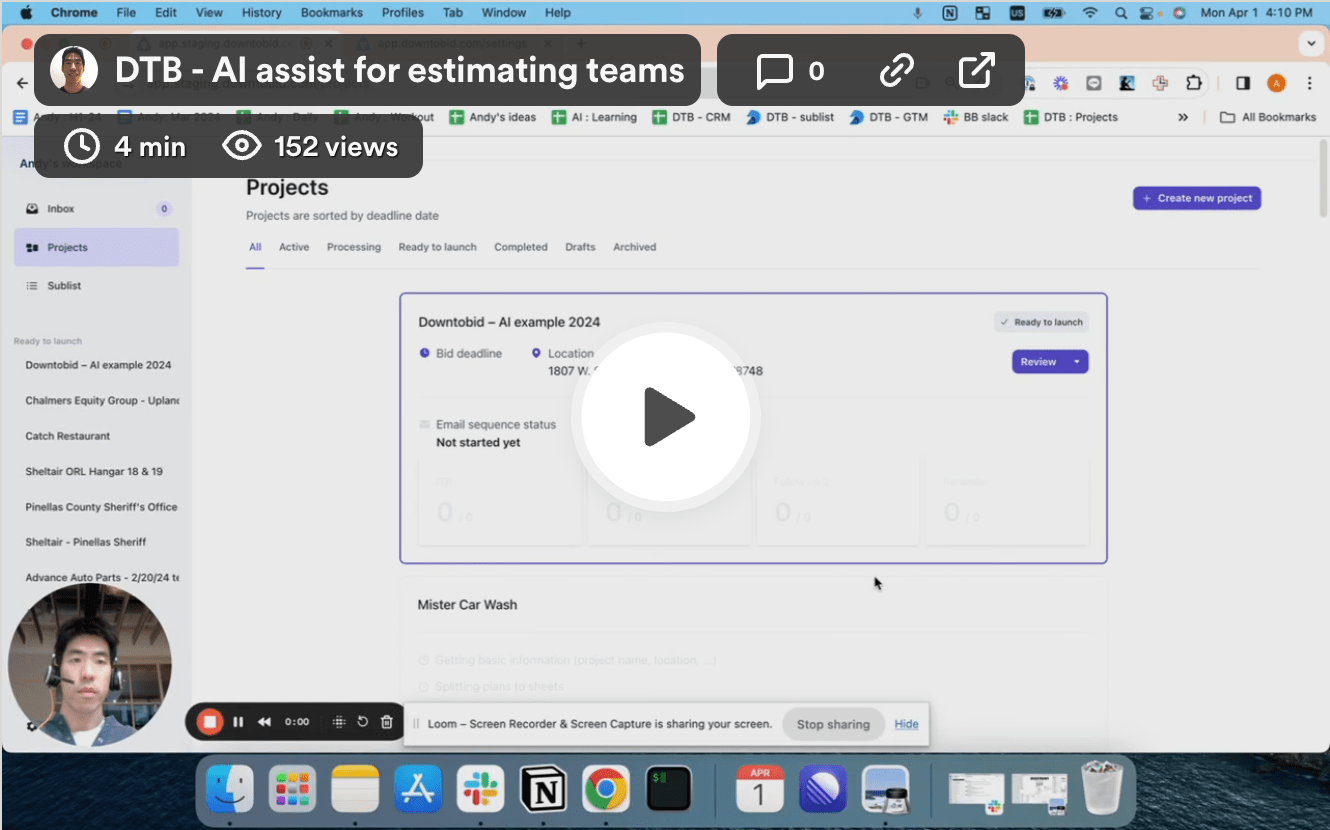
We'll show you how to dissect your project plans, use the dashboard, and send out invites to speed up your bidding process.
Click here to get started.
Upload Your Project Plans
First, upload your project plans. The AI reviews each page of your plan, assessing the scope and compiling the bid packages. This process varies, taking anywhere from 10 to 30 minutes based on your project's complexity. Once completed, you'll be notified via email.
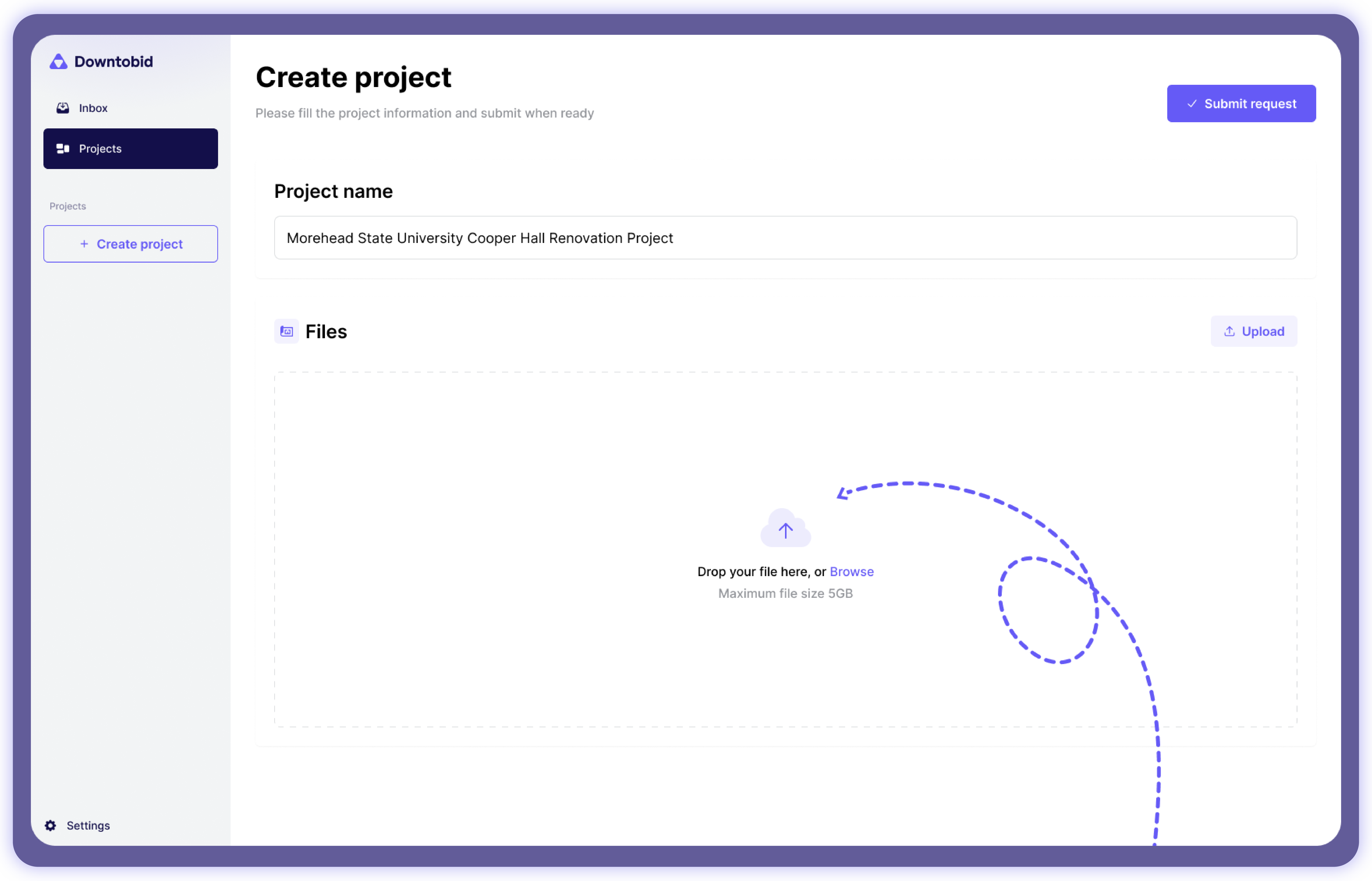
After signing in, you'll be presented with a comprehensive list of bid packages crafted by the AI copilot with the project details. It is easy to track projects in the dashboard. Project managers have tabs with each project files.
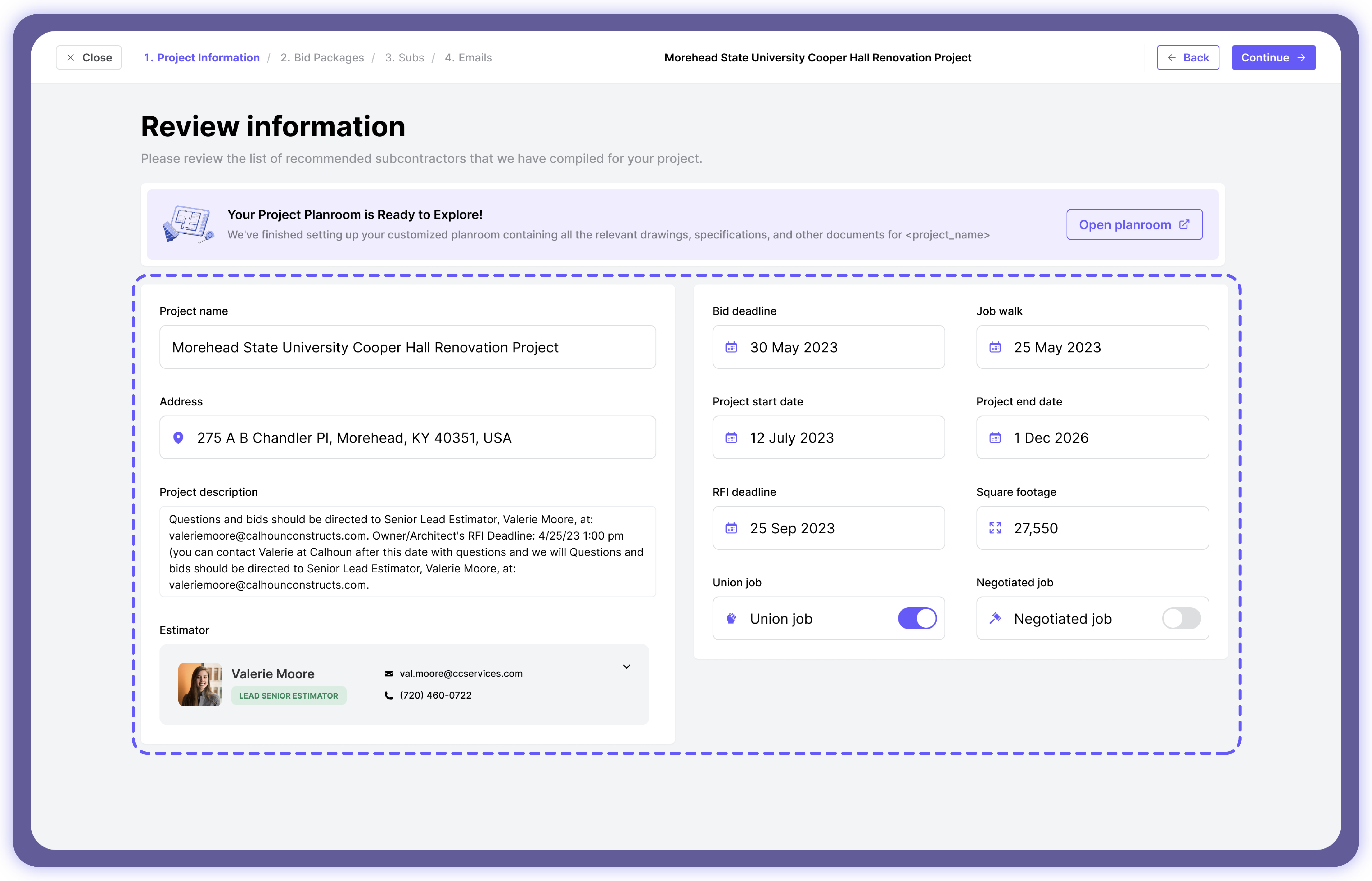
For every package, it crafts a concise scope sheet, detailing:
- A general overview of the bid package.
- Specific areas where the scope has been identified within the plans.
- Recommendations for local, qualified subcontractors you might consider inviting.
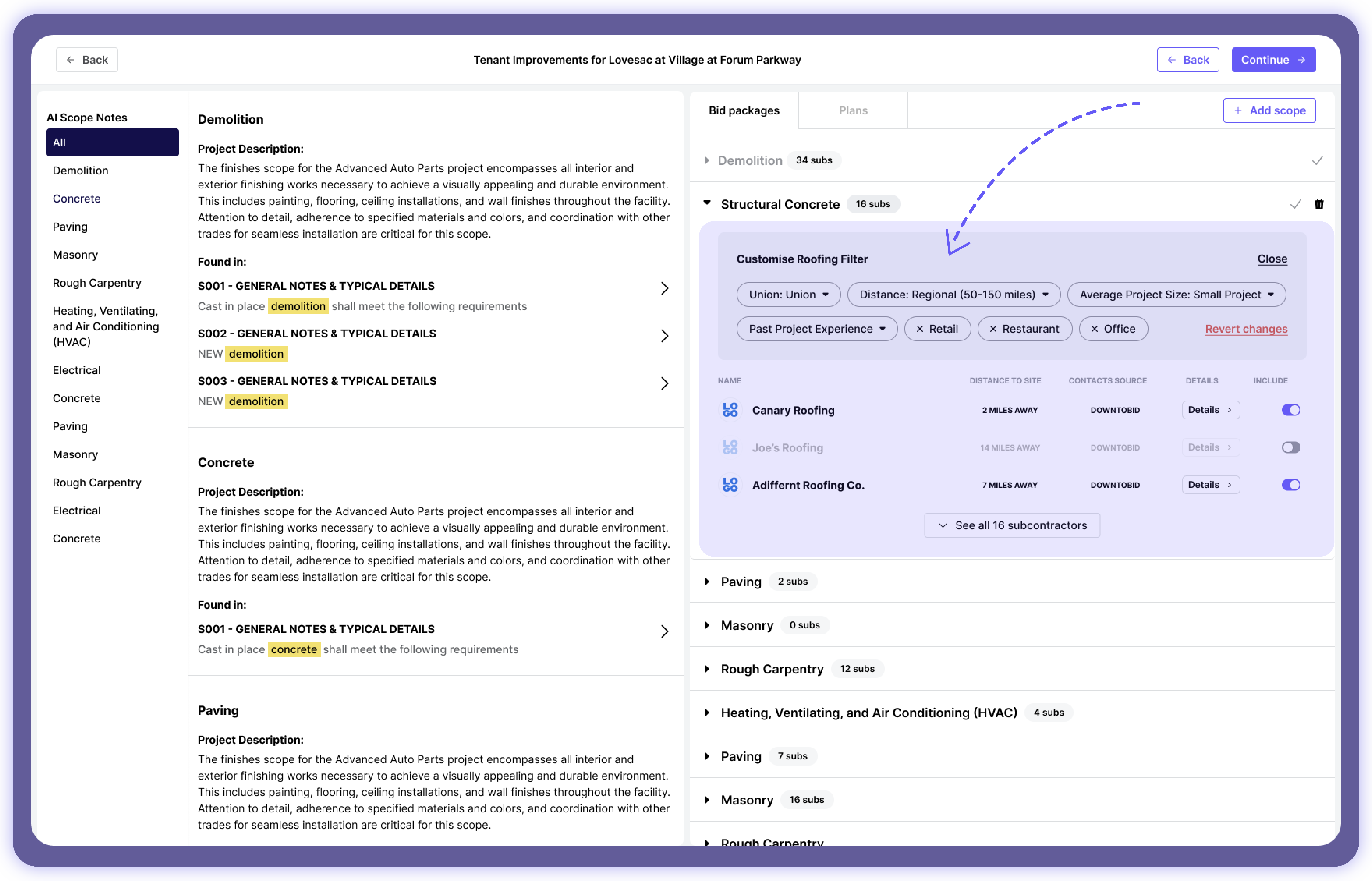
Auto-Proposed Bidding Schedule
Our AI sets up a bidding schedule, sending your ITBs when it counts the most. These ITBs come with custom details and a summary of the scope, making it easy for subcontractors to see if they're a good fit without sifting through every detail. Follow-ups? The system handles those too, adjusting their timing as the proposal deadline gets closer, keeping everything on track automatically.
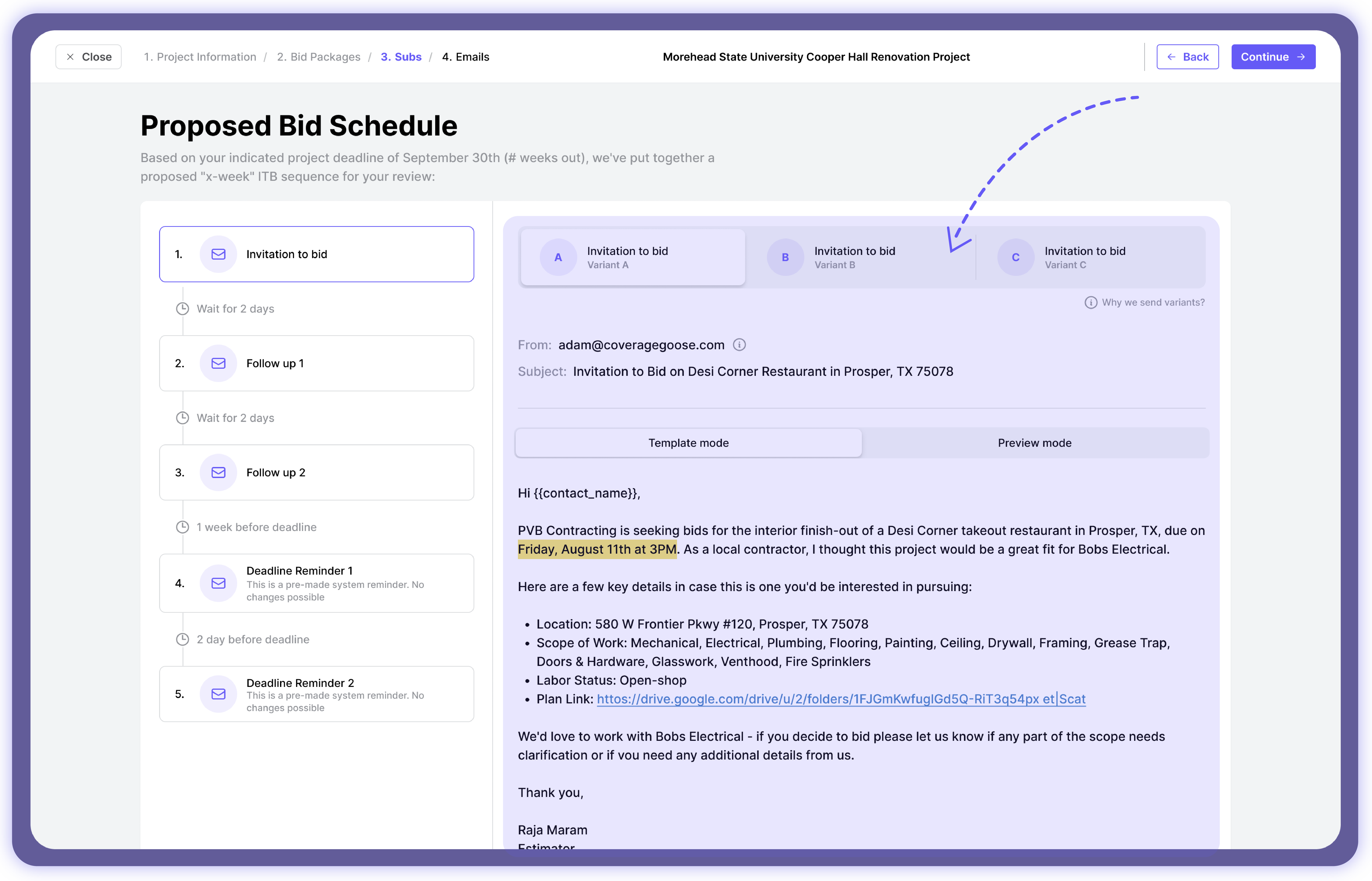
Access The Planroom
We auto-organize the Planroom on behalf the GC into four specific folders: 1) Plans 2) Specs 3) Photos 4) Misc. By using AI to categorize responses—such as not bidding, interested, or actively bidding—we offer a precise snapshot of project interest.
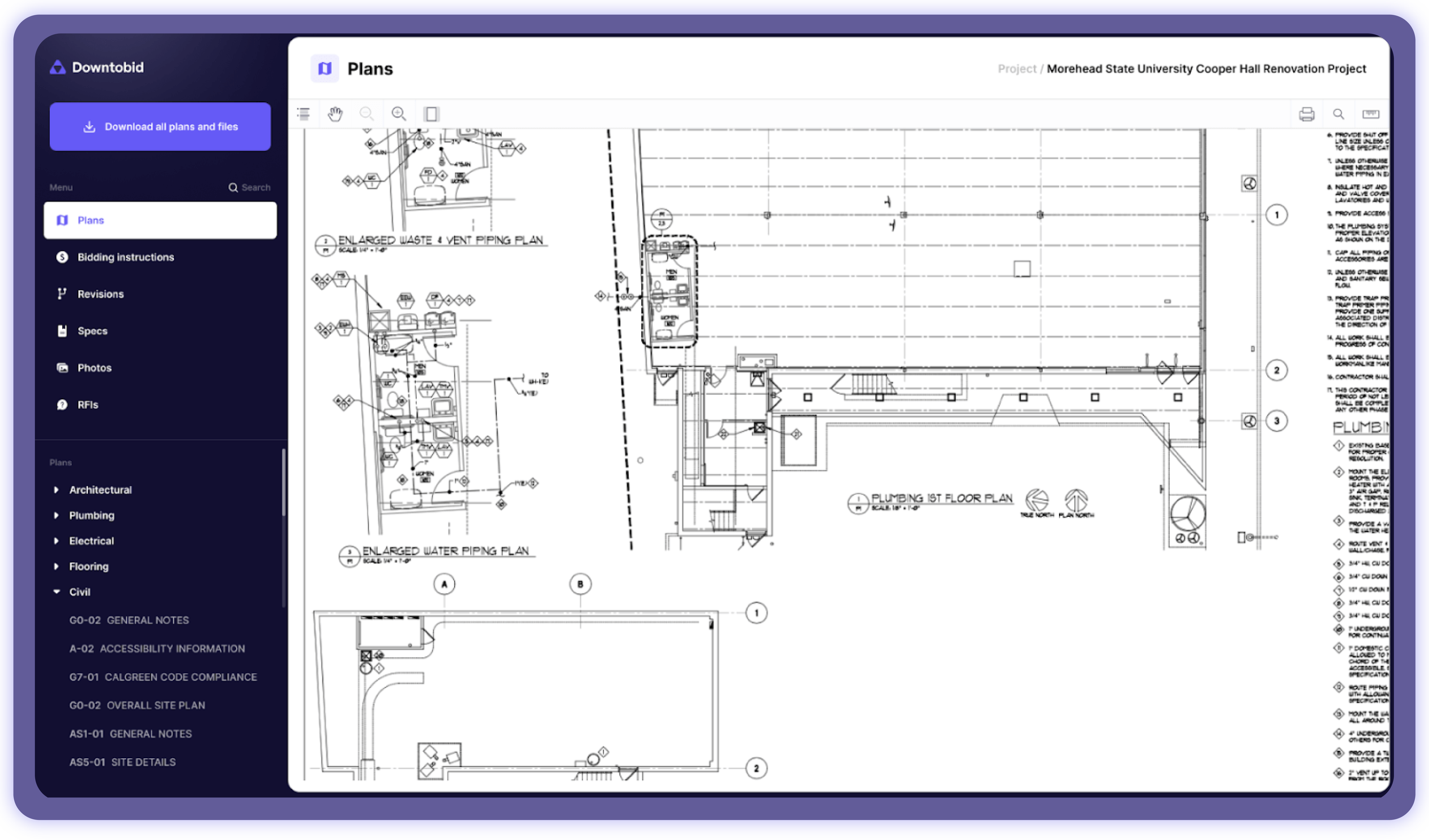
We designed the Planroom for easy subcontractor use, no account needed. It's set up so they can quickly find their specific drawings, with everything automatically indexed and titled for them. This direct approach to showing only the relevant pages helps subcontractors quickly decide if the plans fit their scope, boosting response rates by making the process straightforward and sub-friendly.
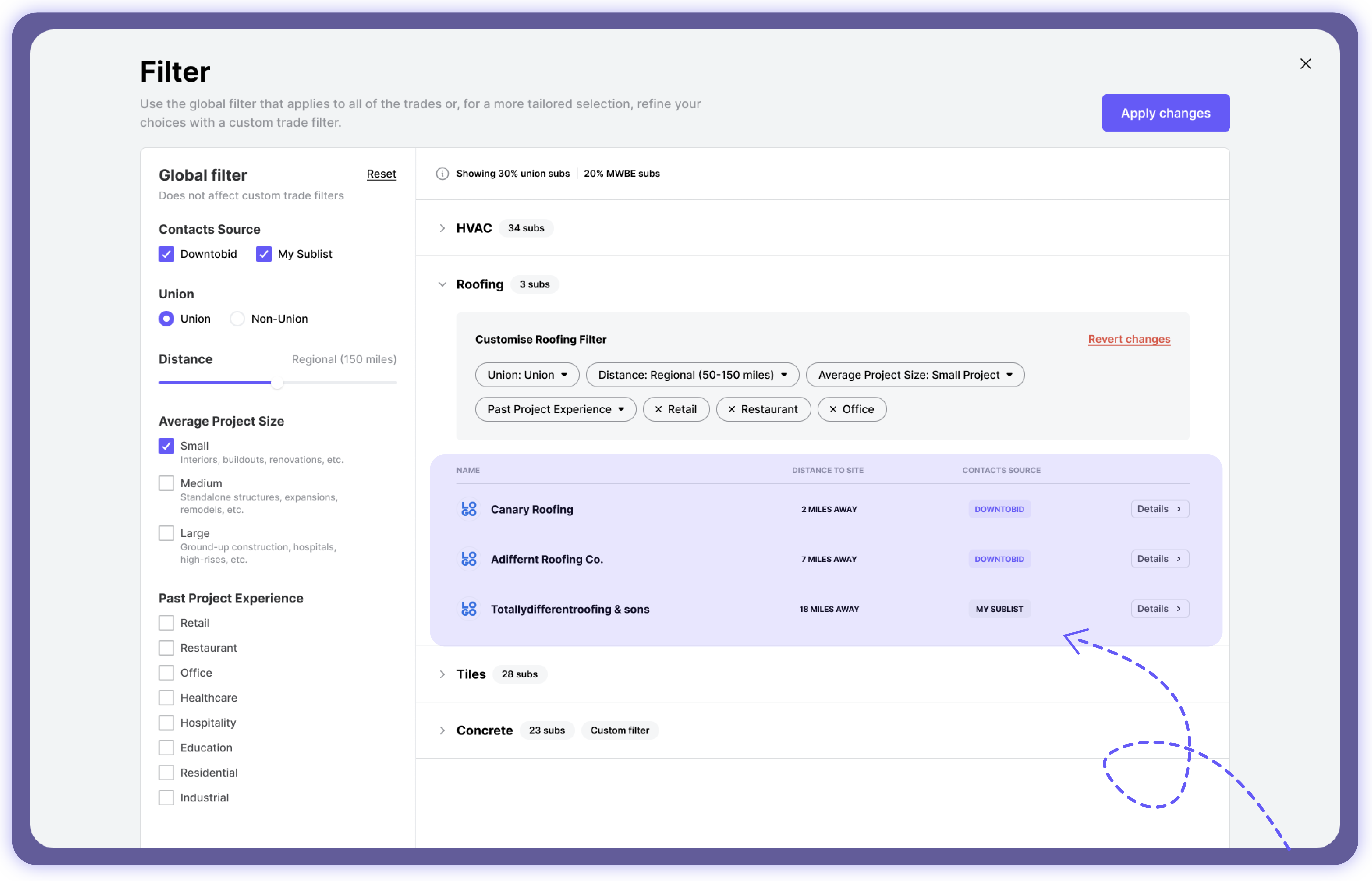
Our process boosts engagement by 30% on average by skipping bidding intent buttons. Instead, our AI analyzes replies and Planroom activity to gauge subcontractor interest, providing more accurate coverage metrics from meaningful interactions.

All emails are directly forwarded to your inbox, allowing you to respond without ever leaving it.
Pricing Plans
We offer flexible pricing plans to accommodate various project scales and needs. From a free plan suited for smaller projects to more comprehensive packages for larger operations. The Basic plan is $150/m and the Pro plan is priced at $500 a user and even comes with a dedicated bid coordinator on each project.
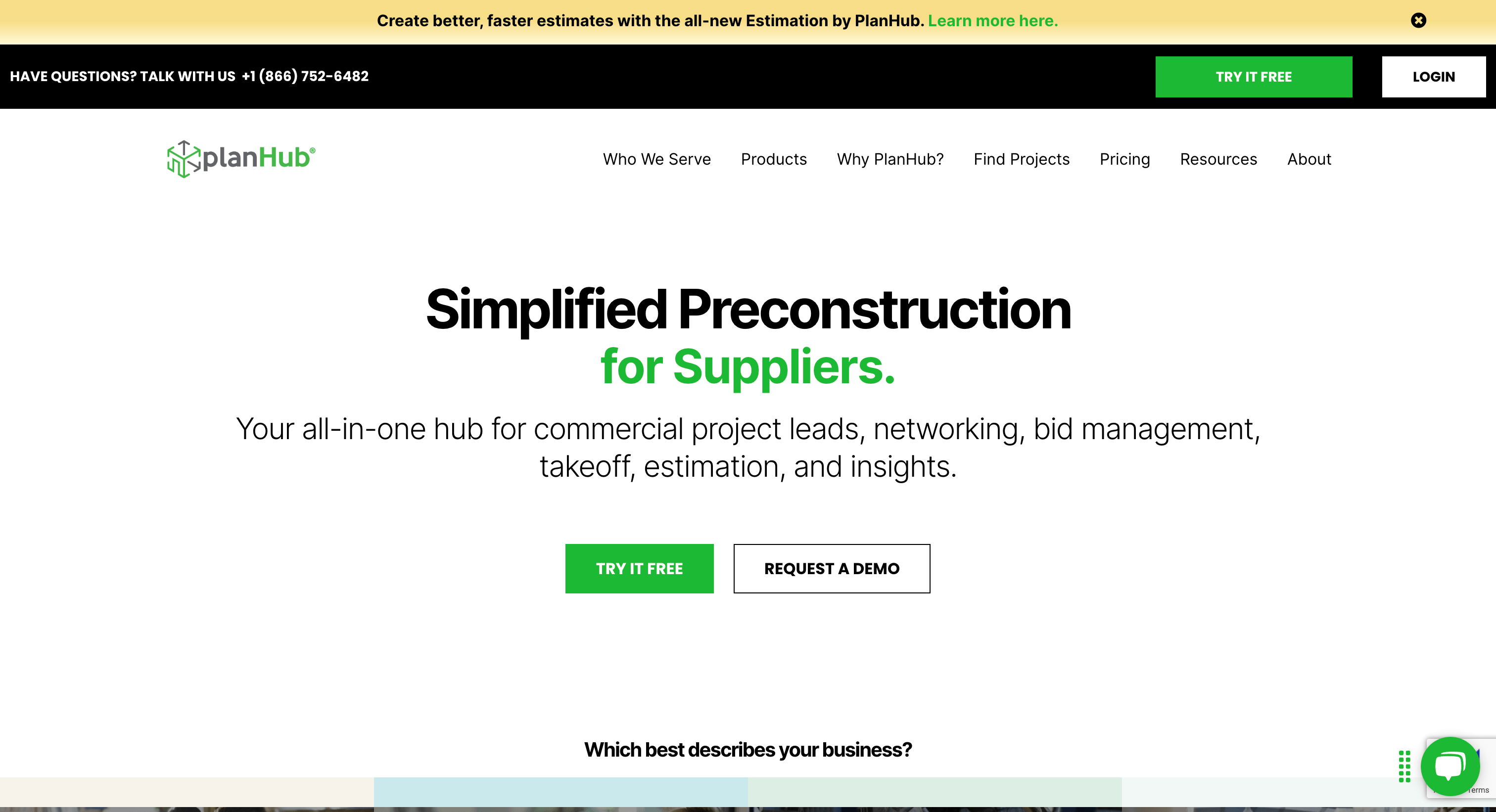
PlanHub Overview
PlanHub is an all-in-one preconstruction platform. It organizes project leads, networking, bid management, and estimation for general contractors, subcontractors, and suppliers. Designed to simplify the preconstruction phase, PlanHub offers a suite of cloud-based tools to improve job discovery, collaboration, and construction business growth within a large network of professionals.
Key Features and Benefits
- Expansive Network: Direct access to numerous construction projects and industry connections.
- Efficient Bidding: Simplified bid management from discovery to submission.
- Advanced Tools: Cloud-based solutions for accurate project planning and execution.
Target User Base and Typical Use Cases
PlanHub is designed for general contractors, subcontractors, and suppliers in the construction industry, catering to a variety of use cases including project discovery, bid management, and collaboration for commercial construction projects.
Pricing
How much does PlanHub cost? Well, here's a breakdown of PlanHub's pricing structure for their software.
Premier Plan:
- Priced at $1,199 per year for a 25-mile radius.
- Options to increase the radius to 50 miles at $1,899, 100 miles at $2,199, and 200 miles at $2,999, providing greater coverage for those needing a wider scope of work.
The Premier plan is designed to simplify bid management and maximize efficiency within PlanHub’s comprehensive suite of tools. It comes with a free start option for a trial period or a limited free version to get users started.
Enterprise Plan:
The Enterprise plan builds upon the Premier, offering national reach and access, allowing users to connect with general contractors across PlanHub's nationwide network.
This plan is tailored for larger teams with three or more users and includes dedicated customer care.
Comparing Downtobid Versus PlanHub Features
Our firsthand experience and PlanHub review has highlighted several critical drawbacks that make it a less favorable option for subcontractors and general contractors alike. We'll dive into them here.
General Usability and Access
PlanHub makes it harder for its users right from the start, including mandatory account creation and payment for basic access to projects and bidder information. This not only adds another step but also places unnecessary barriers between subcontractors and potential work. Our tool is designed with user-friendliness in mind, and does not require a sign up or account creation to use.
Data Quality and Customization
While PlanHub does boast a decent network, it really falls short in allowing users to tailor this network to their specific needs. You cannot select which subs to include. On the other hand, DownToBid employs a multi-step verification process, enhanced by AI, to ensure high-quality, relevant data is always at your fingertips. This includes detailed categorization of subcontractors' trades, project preferences, and an active approach to verifying current business operations.
Bid Coverage
Bid coverage is the bread and butter of bid management software, but not all platforms spread it equally. With PlanHub, users seem to be hitting a wall—there's a clear struggle due to access issues leading to a notable dip in bid coverage. This stems from the layers of difficulty that subcontractors face right from the get-go, such as needing to create accounts and pay extra just to peek at the plans or find out who's behind the bid.
With our software, things look a lot better. Our personalized, email-based ITBs invite them to bid or join the conversation. And it's working—we're seeing about 30% higher response rates. Our software can sort and organize all the responses. It neatly categorizes them into 'not bidding', 'interested', or 'bidding', painting a precise picture of your bid coverage. Check out the other PlanHub alternatives.
Pricing
When it comes to pricing, Downtobid and PlanHub take different routes that could impact your bottom line. PlanHub's pricing structure is a bit of a maze with various tiers and additional costs that can stack up quickly. This might make it a bit tricky for users to figure out what they're actually paying for and why.
In the other corner, Downtobid stands out with its transparent, no-nonsense pricing strategy. At $499 for unlimited users, and a generous 50% off in your first year, it positions itself as the budget-friendly contender with clear value. With Downtobid, the days of surprise fees and complicated pricing tiers are behind you, letting you focus on the bids, not the bills.
Check out our PlanHub vs Building Connected vs Downtobid guide here.
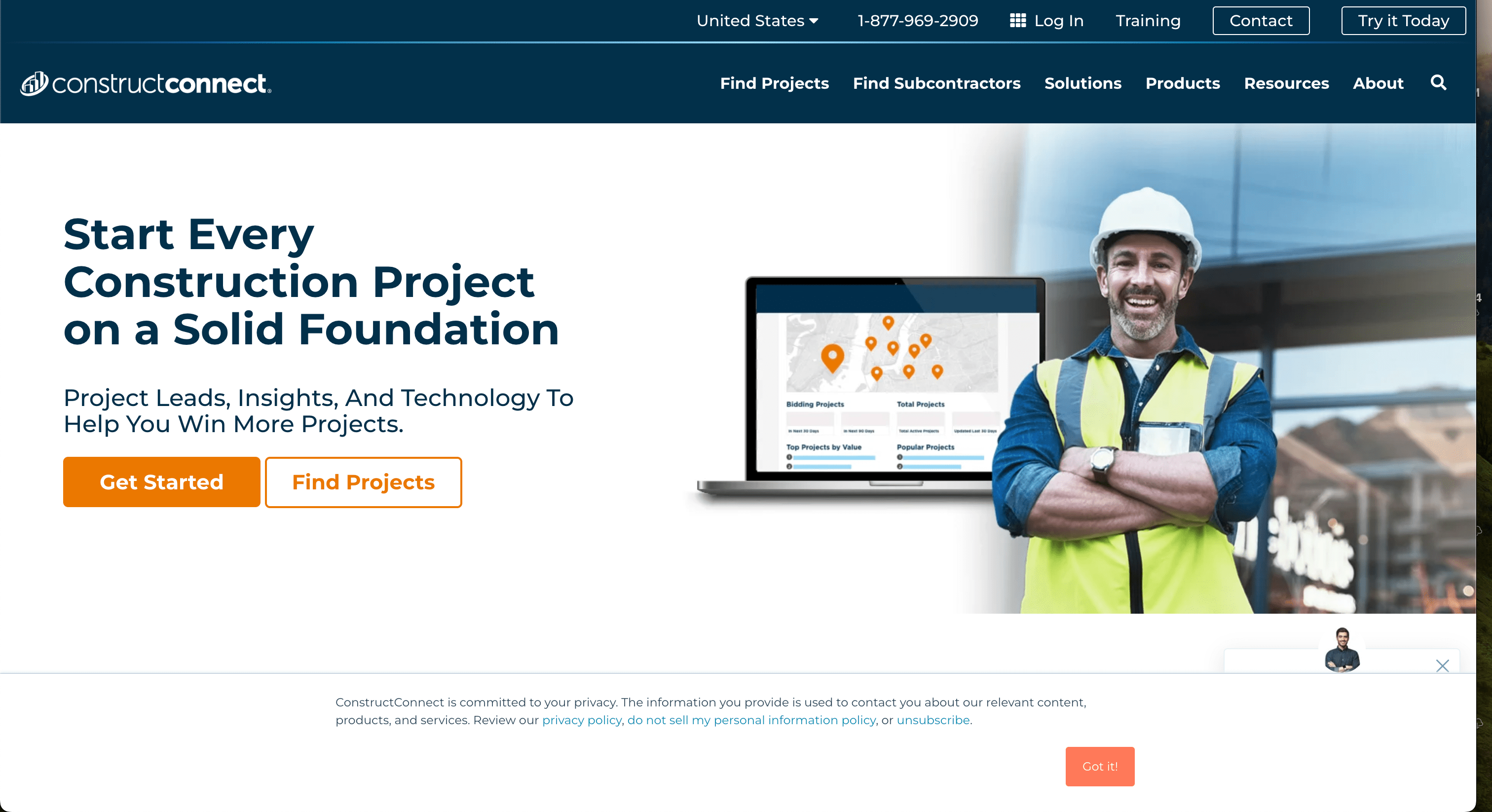
ConstructConnect Overview
ConstructConnect stands out as a leading provider in the construction industry, offering a comprehensive suite of solutions designed to streamline the preconstruction process for commercial construction firms. ConstructConnect is renowned for its software suite that supports the preconstruction phase, helping contractors from the largest network of designers, project owners, general contractors, subcontracts, building product manufacturers, and designers to manage projects seamlessly from inception to bid day.
Key Features and Benefits
ConstructConnect improves bid management by automating ITB creation and evaluation, ensuring contractors can quickly prioritize and engage with the right bidders.
It offers digital takeoff capabilities, making it easier to spot and adjust to scope changes in project plans, which helps in reducing mistakes and saving time.
The software connects a wide network of contractors, enhancing collaboration opportunities and supporting business expansion through detailed analytics for smarter decision-making.
Target User Base and Typical Use Cases
Several features that are either missing or poorly implemented for in PlanHub are addressed by DownToBid. From the intuitive organization of the plan room to the automation of follow-ups and insightful addenda communications, DownToBid is designed to streamline the bidding process comprehensively. Additionally, DownToBid’s emphasis on a subcontractor-friendly approach, including the non-requirement for account creation and direct email replies, sets it apart as the more accessible and efficient platform.
Pricing
Here are the different ConstructConnect pricing models:
Starter Plan
Priced at $129/month, the Starter plan is ideal for those looking to quickly and easily check out bidding projects within their market. This plan includes one license and market, with details and key contacts for all bidding projects, a digital bid board to organize the pipeline, automatic matching of opportunities to your profile, and daily project leads sent to your email.
Professional Plan
Starting at $179/month, the Professional plan is billed annually and the price may vary by market. It encompasses all the Starter plan features plus complete access to bidding documents, bidder and planholder information, and planning projects. This plan offers extensive coverage on bidding projects and is a step up for those needing deeper insights and broader market reach.
Pro + Takeoff Plan
This plan is ConstructConnect's comprehensive offering that combines all Project Intelligence functionalities with fast, accurate takeoff software, which is known to improve win rates. It includes customizable takeoff for specific trades, with features like auto-count, multi-condition, overlay, and more, making it a solid choice for businesses looking to leverage industry-leading project data alongside advanced digital takeoff capabilities.
Feature Comparison With Downtobid
Here's a side-by-side comparison of Downtobid and ConstructConnect's key features.
Bid Management and Invitation
Our software outperforms ConstructConnect with a direct, frictionless approach to bid management and bid invitations, cutting through the red tape that holds others back. We help users with email-based ITBs tailored to draw higher engagement, receiving a 30% higher response rate — a sharp contrast to ConstructConnect's more involved access system. Downtobid leverages AI to classify subcontractor interest, offering a much clearer picture and actionable insights.
Pricing Structure
Downtobid offers a clear-cut pricing advantage with its straightforward $499 for unlimited users, alongside a 50% discount for the first year, positioning it as the cost-effective choice. This transparent model means no hidden fees, no surprise charges—just value.
ConstructConnect, while presenting a tiered pricing strategy starting at $129/month for its Starter plan and scaling up based on additional features and services, may not clearly communicate the costs you'll need to spend every month.
When you stack our software's transparent pricing against ConstructConnect's variable costs, Downtobid presents a compelling value proposition. Customers get a comprehensive set of features without the complexity of tiered pricing, making it easier to budget and plan for the year ahead.
Data Quality and Network Reach
Downtobid delivers accuracy you can count on with its multi-tiered verification process for subcontractor data, combining AI precision with proactive checks to ensure the most up-to-date and relevant information for users. ConstructConnect has a vast network but doesn’t highlight a similar level of data validation, which leaves room for outdated contacts. This low-quality contacts may not make ConstructConnect worth it. Downtobid's verification gives users a clear edge with trustworthy, actionable project leads.
Conclusion and Recommendations
When you stack up PlanHub, ConstructConnect, and Downtobid, it’s clear they each hit different marks for construction pros. Planhub brings a wide network but could trip you up with its paywalls for basic access. ConstructConnect packs a punch with project insights but gets dinged for glitchy access points. Downtobid, meanwhile, steals the spotlight with its no-nonsense pricing and spot-on subcontractor info, thanks to a smart AI and rigorous data checks. Choosing the right platform? It boils down to what’s non-negotiable for you: network size, reliability, or straight-up data accuracy and cost clarity.